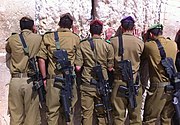Tachanun

Tachanun ( Hebrew תַּחֲנוּן; dt .: ask for mercy ) is a Jewish prayer .
description
Tachanun is part of Shacharit and Mincha . The prayer is recited after the amidah . Prayer is not said on Shabbat or on Jewish holidays.
action
During this prayer, it is an Ashkenazi tradition to bow, kneel and touch the ground with your forehead. Or you lean forward while sitting and put your head on your right arm. Hence this prayer is also called nefilat apajim ( Hebrew נְפִילַת אַפַּיִם; dt .: "falling on the face") called. This is due to the history, because Joshua's face before the ark touched the ground. In contrast to the Ashkenazi tradition, Sephardim do not lay their heads on their hands.
Sections
Tachanun consists of the following sections:
- 1st section
In most Ashkenazi synagogues , Tachanun begins with the introductory verses from 2 Samuel (24:14), followed by Psalm 6 : 2-11, composed by King David . David did this while he was sick and in pain.
- 2nd section
The second section is the “Shomer Israel” prayer.
“Guardian of Yisrael, guard the rest of Israel and don't let Yisrael perish, they say: Hear Israel! Guardian of the unified people, guard the rest of the unified people and do not let perish the unified people who pronounce the unity of your name: 'God our God, God is the only one!' Guardian of the holy people, guard the rest of the holy people and do not perish the holy people who sanctify the saints with threefold sanctification. You let yourself be moved by pity and pacified by pleading petitions, let yourself be moved and pacified to the poor sex, who otherwise have no support. Our father, our king, give us grace and answer us, if we have no achievements to show, show us benefit and love and help us. " |
||||
After the words wa'anachnu lo neda ( Hebrew וַאֲנַחְנוּ לֹא נֵדַע; We don't know what to do) it is customary in many churches to stand up and stand up for the remainder of the last paragraph.
“We don't know what to do, for our eyes are on you. Remember how your mercy, God, and your love affairs have always been. Waste your love over us, God, as we wait for you. Do not think of the sins of the front, let your mercy come half ahead of us, for we have sunk a lot. Grace us, God, grace us, for we are exceedingly full of contempt; while we tremble, be mindful of mercy. For he who knows our structure will never forget that we are dust. Help us, God of our salvation, for the honor of your name, save us and make atonement for our offenses, according to your name. " |
||||
Prayer texts
In Shacharit, the Tachanun is always followed by the “Half Kaddish” and for Mincha by the “Full Kaddish”. On Monday and Thursday, before Tachanun, a longer standing prayer is recited, beginning with Psalm 78:38. The length of the prayer before Tachanun varies greatly depending on the church. Ashkenazi communities have the longest text; Sephardic (Hasidic and Yemeni, imitating the Sephardic) communities have a slightly shorter but similar text; Italian parishes have the shortest text of all. The Italian text does not begin with Psalm 78:38 but with Daniel 9.15.
The Talmud (Baba Kamma) means that the working days Monday and Thursday is the marriage of Ratzon ( Hebrew עֵת רָצוֹן; dt .: time of divine goodness), at which a supplication is also accepted.
According to the Sephardic rite, Tachanun begins with the Widdui ( Hebrew וִידּוּי; German: "Confession, confession of sin, confession"). In the confession of sins, the sins are enumerated: For every sin that the person praying for, he symbolically hits the heart with his right fist according to God's thirteen attributes of mercy .
- Tachanun today
See also
Web links
- Forms of Adoration on jewishencyclopedia.com
- Tachanun on jewishencyclopedia.com
- Tachanun on jewishvirtuallibrary.org
- NAFILLATH APAYIM STUDIES on chayas.com
- The Tachanun prayer on ravkooktorah.org
Individual evidence
- ↑ Israelitische Cultusgemeinde Zurich Ed .: Siddur schma kolenu. (Translation by Joseph Scheuer, text editing Albert Richter, editing and concept Edouard Selig) Verlag Morascha, Basel 2011, OCLC 884483697 , p. 71: Lemma after Siddur.
- ↑ Langenscheidt Achiasaf Concise Dictionary Hebrew-German. Langenscheidt, Berlin 2004, OCLC 57476235 , p. 600. ( תַּחֲנוּניִם request for mercy תְּחִנָּה supplication; prayer for mercy).
- ↑ Israelitische Cultusgemeinde Zurich Ed .: Siddur schma kolenu. (Translation by Joseph Scheuer, text editing Albert Richter, editing and concept Edouard Selig) Verlag Morascha, Basel 2011, OCLC 884483697 , p. 74.
- ↑ a b Samson Raphael Hirsch : Siddûr tefillôt Yiśrāʾēl, Israel's prayers, (סדור תפלות ישראל). I. Kauffmann, Frankfurt a. M. 1895, OCLC 18389019 , p. 176 ff ( archive.org ).
- ↑ Langenscheidt Achiasaf Concise Dictionary Hebrew-German. Langenscheidt, Berlin 2004, OCLC 57476235 , p. 156.



